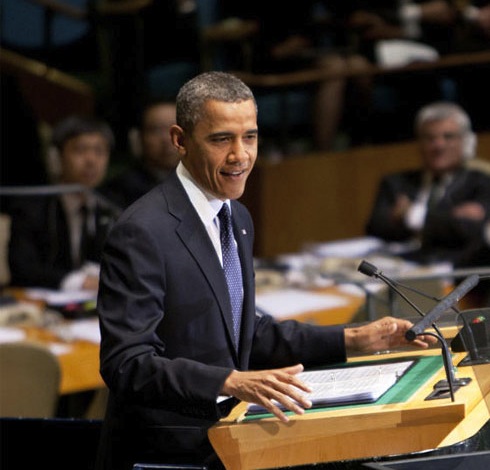President Obama told the General Assembly at the United Nations that the “United States will do what we must to prevent Iran from obtaining a nuclear weapon,” but warned that time “is not unlimited,” to resolve the issue diplomatically.
 “America wants to resolve this issue through diplomacy, and we believe there is still time and space to do so,” Obama said. “We respect the right of nations to access peaceful nuclear power,” he added, but Iran “has failed to take the opportunity to demonstrate that its nuclear program is peaceful.”
“America wants to resolve this issue through diplomacy, and we believe there is still time and space to do so,” Obama said. “We respect the right of nations to access peaceful nuclear power,” he added, but Iran “has failed to take the opportunity to demonstrate that its nuclear program is peaceful.”
Iran has repeatedly stated that its nuclear program is for peaceful purposes only and that it is not interested in obtaining nuclear weapons. The UN nuclear watch-dog, the International Atomic Energy Agency (IAEA), has continuously inspected Iran’s declared nuclear sites, finding again and again that there is no evidence that Iran is diverting any of the nuclear material to any undeclared sites.
Additionally, and as the Obama administration itself has repeatedly pointed out, the consensus in the US intelligence community is that Iran has no nuclear weapons program and that any weaponization activities were dismantled as far back as 2003.
Contrast that with the US’s main ally in the Middle East, Israel, which has pressured the Obama administration towards a pro-war stance on Iran, and which has a secret nuclear weapons program of its own that it refuses to open up for international inspections.
Obama claimed “a nuclear-armed Iran is not a challenge that can be contained.” He said “It would threaten the elimination of Israel, the security of Gulf nations, and the stability of the global economy” and that, “It risks triggering a nuclear-arms race in the region.”
There is no evidence and no reason at all to believe that a nuclear-armed Iran would drop atomic bombs on Israel, thus inviting retaliation by nuclear-armed adversaries like Israel and the United States, as Obama implied. Many, if not most, international relations scholars believe that a nuclear-armed Iran could in fact be contained and that there is little reason, historically speaking, that it would spark a nuclear-arms race in the region.
“Every time another country has managed to shoulder its way into the nuclear club,” wrote renowned scholar Kenneth Waltz in Foreign Affairs recently, “the other members have always changed tack and decided to live with it. In fact, by reducing imbalances in military power, new nuclear states generally produce more regional and international stability, not less.”
“Israel’s regional nuclear monopoly,” Waltz added, “which has proved remarkably durable for the past four decades, has long fueled instability in the Middle East. In no other region of the world does a lone, unchecked nuclear state exist. It is Israel’s nuclear arsenal, not Iran’s desire for one, that has contributed most to the current crisis. Power, after all, begs to be balanced.”
Obama’s UN comments occur in the context of a US administration that publicly admits Iran doesn’t have a nuclear weapons program, but has nonetheless moved to militarily surround Iran and heap harsh economic sanctions on the country, despite the tragic suffering to millions of civilians it is causing.


